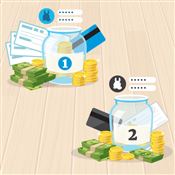Best Joint Checking Accounts for 2025
Ad Disclosure: This article contains references to products from our partners. We may receive compensation if you apply or shop through links in our content. This compensation may impact how and where products appear on this site. You help support CreditDonkey by using our links.
Explore an expert review of the top joint checking accounts for your needs: married couples, unmarried couples, parents-teens, and businesses.
 |
Bank of America Advantage Banking - Up to $500 Cash Offer
- The cash offer up to $500 is an online only offer and must be opened through the Bank of America promotional page.
- The offer is for new checking customers only.
- Offer expires 1/31/2026.
- To qualify, open a new eligible Bank of America Advantage Banking account through the promotional page and set up and receive Qualifying Direct Deposits* into that new eligible account within 90 days of account opening. Your cash bonus amount will be based on the total amount of your Qualifying Direct Deposits received in the first 90 days.
Cash Bonus Total Qualifying Direct Deposits $100 $2,000 $300 $5,000 $500 $10,000+ - If all requirements are met 90 days after account opening, Bank of America will attempt to deposit your bonus into your new eligible account within 60 days.
- Bank of America Advantage SafeBalance Banking® for Family Banking accounts are not eligible for this offer.
- Additional terms and conditions apply. See offer page for more details.
- *A Qualifying Direct Deposit is a direct deposit of regular monthly income – such as your salary, pension or Social Security benefits, which are made by your employer or other payer – using account and routing numbers that you provide to them.
- Bank of America, N.A. Member FDIC.
HSBC Premier - Earn Up to $3,500
- Get a $1,000 Cash Bonus: Add and maintain New Deposits of $150,000 to $249,999
- Get a $2,500 Cash Bonus: Add and maintain New Deposits of $250,000 to $499,999
- Get a $3,500 Cash Bonus: Add and maintain New Deposits of $500,000+
Earn a $25 Extra Cash Bonus when you register and logon to the HSBC US Mobile Banking App3 by December 31, 2025.
If all offer requirements are met, Cash Bonuses will be paid by May 31, 2026.
Wells Fargo Everyday Checking Account - $325 Bonus
- Get a $325 new checking customer bonus when you open an Everyday Checking account and receive $1,000 or more in qualifying direct deposits.
- Wells Fargo Bank, N.A.
Member FDIC
Want sharing finances to be easier? A joint bank account may be the answer.
But not all joint accounts are created equal. Before you open one, it's best to lay out a plan for how the account will be used.
Discover the best joint checking accounts available, how to open one, pros and cons, and more.
Here are 9 great checking options you can open with someone:
- Axos Bank Rewards Checking for High APY
- SoFi Checking and Savings for Fee-free Checking
- Capital One MONEY as Parent/Teen Account
- Chase Total Checking® Account as Big Bank Option
- Ally Spending Account for Optional Savings
- Quontic High Interest Checking for Rewards
- Alliant High-Rate Checking as Credit Union Option
- Chime Checking Account for Second Chances
- Bluevine Business Checking for Business Owners
Best Joint Checking Accounts
 |
The bank accounts below were chosen based on several factors. These include monthly fees, interest rates, cash back rewards, sign-up bonuses, and convenience of ATMs.
The PARTNER rule helps you remember the key aspects to consider when choosing a joint checking account:
- Protection: Ensure the account offers strong security features and fraud protection.
- Accessibility: Look for easy access to funds through ATMs, branches, and online banking.
- Rates: Check for competitive interest rates and fee structures.
- Tools: Ensure the account provides useful financial management tools.
- No fees: Aim for accounts with minimal or no maintenance fees.
- Easy management: The account should be simple to manage for both account holders.
- Rewards: Look for any rewards or benefits offered by the account.
Axos Bank Rewards Checking For High APY
Axos Bank Rewards Checking gives you the opportunity to earn Up to 3.30% APY. It has a series of conditions to unlock a special interest rate every time you fulfill one.
For example, if you receive monthly direct deposits totaling to at least $1,500, you get 0.40% APY. You could add 0.30% APY if you use your Axos Visa® Debit Card for a total of 10 transactions per month, and so on, until you reach the maximum APY possible.
There are no overdraft fees and no ATM fees. Axos will provide unlimited domestic ATM fee reimbursements.
Rewards Checking - Up to 3.30% APY
- Minimum Deposit Required: $0
- Balance Requirement: $0
- Monthly Fee: No monthly maintenance fee
- APY: Up to 3.30%
- ATMs: Unlimited domestic ATM reimbursements
- Perks: Get your first set of 50 checks free
SoFi Checking and Savings For Zero Fees
Online banks often enable customers to get more value-added benefits than traditional banks. This is why SoFi is a popular option. It combines fee-free checking with high-earning savings, making a perfect case for 2-in-1 checking and savings accounts.
You don't pay monthly fees, no overdraft charges, no ATM fees (within the Allpoint network) — nothing.
If at all, the only charge you'll probably encounter is when you make a cash deposit, which you can easily skirt if you opt for online transfers to fund your account instead. Technically, it's a third-party fee, not SoFi's.
Sofi Checking and Savings
- Up to 3.60% APY with direct deposit on savings balances
- $0 monthly fees
- No minimum balance
- Get paid 2 days early
Capital One MONEY for Parents & Kids
Capital One MONEY is a joint checking account that helps parents teach their children about banking and money management. Though it's designed for teens, it's available to any kids age 8+.
This account comes with a debit card for kids and a suite of parental control features. It makes it easy for parents to transfer allowances or gift money. You can track your kids' activities and even lock/unlock their debit card.
There are no minimum balance requirements or monthly fees.
MONEY Teen Checking Account
- Minimum Deposit to Open: $0
- Balance Requirement: $0
- Monthly Fee: $0
- APY: 0.10%
- ATMs: 70,000+ Capital One, MoneyPass, or Allpoint ATMs
Chase Total Checking® as Big Bank option
If you're looking for a brick-and-mortar bank, Chase Total Checking provides the convenience of over 4,700 branches and 15,000+ Chase ATMs nationwide.
Although this account comes with a monthly fee, you can waive it quite easily. One way is to make electronic deposits totaling $500 or more, which is fairly manageable.
Chase is also known for their new customer bonus offers. It also has a top-rated mobile app and excellent customer service.
Ally Spending Account for Optional Savings
Ally offers an excellent checking account with interest. But you can really get the most out of it by pairing it with a savings account.
When linked, you can use a roundup feature that sends the change of any debit card purchase directly into your savings account. Ally can also analyze your checking account for extra money, then transfer it automatically to your savings.
You can create up to 30 different savings "buckets."[1] This makes it easy to save and track different personal and shared savings goals.
Interest Checking
- Minimum Deposit Required: $0
- Balance Requirement: $0
- Monthly Fee: $0
- APY: 0.10% APY for daily balances less than $15,000; 0.25% APY for daily balance over $15,000
- ATMs: 75,000+ Allpoint and MoneyPass ATMs
- Perks: Up to $10 ATM fee reimbursements per month
Online Savings Account - 3.30% APY
- Balance Requirement: $0
- Monthly Fee: $0
- APY: 3.30%
Quontic High Interest Checking Account
Quontic Bank has account options for everyone — spenders, savers, and even those interested in innovative financial solutions:
- High Interest Checking
- Cash Rewards Checking
Quontic Bank offers one of the largest ATM networks. You can use over 90,000 Allpoint, MoneyPass, SUM, or Citibank ATMs with no fees.
Quontic Checking Account holders can also get a Quontic Pay Ring for convenient contactless payments. Just make sure you remain active, as Quontic charges a $5 inactivity fee per month.[2]
High Interest Checking - Up to 1.10% APY
- Earn up to 1.10% APY
- $100 minimum opening deposit
- APY is based on the account balance and making at least 10 qualifying debit card point-of-sale transactions of $10.00 or more per statement cycle.
Alliant High-rate Checking Account
Alliant is the only credit union on our list. Member-owned credit unions like Alliant are famous for superior customer service and a focus on putting members over profits.
The Alliant High-Rate Checking account has no monthly fees and offers interest to help you grow your money.
Debit card holders can also use over 80,000 ATM CO-OP, Allpoint, and MoneyPass ATM locations.
Plus, if you have to use an out-of-network machine, Alliant gives you up to $20 of monthly ATM fee reimbursements.
High-Rate Checking
- Minimum Deposit Required: $0
- Balance Requirement: $0
- Monthly Fee: $0
- APY: 0.25% APY when you opt in to eStatements and have at least one monthly electronic deposit to your account
- ATMs: 80,000+ fee-free ATMs
- Perks: Up to $20 ATM fee rebates per month; free first box of checks
Chime Checking Account
If both you and your co-owner have poor or no banking history, Chime offers arguably the best second chance account.
That's because Chime does not check your credit or your ChexSystems score.
Overdraw your account? No problem. With Chime's SpotMe feature, you can overdraw your account up to $200 and simply pay it back later with no fees (eligibility requirements apply).
The Chime mobile app is easy to use for all your basic needs. You can transfer money between accounts, deposit checks remotely, request a replacement debit card, and monitor spending.
Chime also offers a respectable 1.00% APY with their savings accounts and there are no monthly fees and no minimum balance requirements.[3]
Chime Second Chance Banking
- No monthly maintenance fee
- No overdraft fees
- No foreign transaction fees
- 50,000+ fee-free ATMs
Bluevine Business Checking for SMEs
Bluevine Business Checking is a popular online business checking account for its high APY.
You can earn 3.5% APY on balances up to $3M for Premier customers; 2.4% APY on balances up to $250,000 for Plus customers; 1.3% APY on balances up to $250,000 for Standard tier customers that meet monthly eligibility requirements.
It comes with a lot of great features, such as free checkbooks, ability to deposit cash (with a small fee) at 90,000+ Green Dot locations and 1,500+ Allpoint+ ATMs, multiple debit cards for authorized users, and free sub-accounts. You can create and send unlimited invoices and payment links.
You can also add as many users as you want. So it's great for businesses with multiple owners. You can set the level of account access each user gets (full, limited, or read-only).
Free Business Checking - Up to 1.3% APY
- Minimum Deposit to Open: $0
- Balance Requirement: $0
- Monthly Fee: $0
- APY: 1.3% APY on balances up to $250,000 with monthly eligibility requirements; 0% APY on balances over $250,000
- ATMs: Approximately 40,000 MoneyPass ATMs
- Perks: 1 free checkbook for the life of the account; No non-sufficient funds fee
What Are Joint Checking Accounts Used For?
A joint checking account is owned by two or more people to manage shared financial expenses. This could be between business partners, married couples, parents and their kids, or family members.
Such an account can be useful for helping an elderly parent manage their finances, pay bills, and monitor spending. If you have a child, you can deposit funds in it for their schooling and other needs.
Between travel partners, it simplifies managing split expenses like lodging, transportation, and activities.
How Does a Joint Checking Account Work?
Joint checking accounts are like any other checking account. But since there are at least 2 individuals involved, you all will typically have equal access to the money. This means you can request a debit card, write checks, and withdraw funds without requiring permission from the other co-owner/s.
In addition, the account holders share responsibilities like paying bank fees and taxes from interest earnings (if any).
It is possible to remove your name from a joint checking account. Since banks' policies may vary, you need to check with your bank or financial institution if they will require consent of the other account holder/s.
Pros & Cons
Pros
- Simplifies financial management
- Better transparency
- Quicker access to funds (especially during emergencies)
- Fosters collaboration when you have savings goals (i.e. a new home or wedding)
- Teaches financial responsibility (when kids are your co-account holders)
- Higher insurance coverage
Cons
- Shared liability
- Limited financial privacy
- Potential for conflict
Types of Joint Bank Accounts
Joint bank accounts come in several types, each designed for a particular preference or need. Here are some of them.
Joint Tenants with Rights of Survivorship (JTWROS)
Perhaps the most common type of a joint bank account, JTWROS automatically transfers any remaining funds to the surviving account holder if a co-owner passes away.
Tenants in Common (TIC)
Unlike JTWROS, the share of the deceased account holder in a TIC goes to their estate or designated beneficiary.
Convenience Account
Another person is allowed to transact with the account on behalf of the actual account holder. This means they can withdraw from the funds but they don't have any ownership over the account.
Joint Business Account
This holds corporate funds which typically grants access to 2 or more people involved in the company.
2 things can happen with the death of an account holder in a joint checking account. One is that the funds will automatically belong to the surviving account holder. If it's a Tenants-In-Common account, the share of the deceased account holder goes to their heirs (who may or may not be the co-account holder).
When To Consider a Joint Checking Account
There are several scenarios that make a case for opening a joint checking account. One is if you are a married couple. Given shared expenses, keeping one account provides more transparency, streamlined payments, and easier tracking.
A joint account with young children may be a sound choice for parents. This way, they can guide them in their finances and teach financial responsibility.
If you want to assist elderly parents with their money matters, opening a convenience account is one way to go about it. You can help them pay bills, etc. while they still get to keep full ownership of their account.
How to Choose the Best Joint Checking Account
Shopping for the best joint checking account for you and your partner may require evaluating the following aspects against your needs and financial goals.
Features
Does the joint checking account offer bill pay services? What about interest on balances, cashback rewards or other perks?
Fees
While there are many fee-free checking options, check if the monthly and other bank fees are something you both can live with in exchange for its benefits.
The account holder whose SSN or TIN is associated with the joint bank account is typically responsible for reporting any interest income to the IRS using Form 1099-INT. If your co-account owner (who isn't your spouse) has a share in that income, you may allocate their portion by issuing them a separate Form 1099-INT.
Accessibility
Many deposit accounts come with mobile apps, providing utmost convenience to account holders. You also want to ensure there are nearby ATMs that belong to your bank's network.
Customer support
Consider availability and quality of customer service via phone, online chat, or in-branch assistance.
Security
Check your account's fraud protection measures such as if they have a 2-factor authentication process when accessing your account online.
Joint bank accounts can be safe, but you have to be aware of its potential risks. There is a possibility of misuse or mismanagement of your co-owner, more so if your relationship with that person ends. To mitigate such risks, it will help opening an account with someone you fully trust and reviewing your account regularly.
How to Open a Joint Bank Account
Opening a joint bank account is the same as opening a standard account as an individual, except there are two or more parties involved.
- First, agree on how you'll use the account.
Communication is key with joint bank accounts. Talk to your account partner to decide what it will be used for, how contributions will work, and your long-term goals. - Choose your bank.
Identify the bank or credit union where you want to open a joint account based on the criteria above. Also, be mindful of any minimum balance requirements. - Gather the necessary documents.
Both parties will need to provide the financial institution documents to verify your identity. You should be ready to supply at least the following documents:- Your Social Security number (SSN) or taxpayer's identification number (TIN).
- A photo ID, such as a state-issued driver's license, state-issued ID card, or government passport.
- Personal info including your name, mailing address, phone number, and email address.
- Your Social Security number (SSN) or taxpayer's identification number (TIN).
- Apply for your joint account.
Visit a bank branch, call, or apply online for your new joint checking account. If there's a minimum opening balance, you may also need to deposit funds before the account is activated.
Generally, a will does not override a joint bank account which is often set up with the rights of survivorship (or the surviving co-owner automatically inherits the entire account balance). But there may be instances that when the account becomes subject to probate
Alternatives to a Joint Checking Account
If you aren't comfortable with a joint checking account, there are other options that can provide some level of shared access or responsibility while still taking charge. Here are some of them:
Separate accounts with linked transfers
Each person has their own individual account which enables you to conduct manual or automatic transfers between accounts to cover shared expenses.
Money transfer apps
Two or more people can easily send money transfers to one another in real-time through P2P payment apps like Venmo and PayPal.
Restricted joint accounts
Open a joint checking account for a specific purpose of managing household expenses like rent, utility bills, etc as an example.
Joint savings accounts
In case you just want to save as a couple, shop for a high-yield savings account to give you better interest earnings.
Budgeting apps
Using online budgeting tools like Quicken and Monarch Money are great for couples to help you manage money and track expenses while keeping your deposit accounts separate.
When closing a joint checking account, you can write a request and have all account holders sign it. Most banks will require only one account holder to close the account in person. In any case, check your bank for special instructions to carry this out correctly.
The Bottom Line
Joint accounts are a great way for marriage or business partners to simplify expenses or to teach your kids about financial responsibility.
Select the account with the right mix of high rewards, low fees, and convenient access that fits your needs.
Bank of America Advantage Banking - Up to $500 Cash Offer
- The cash offer up to $500 is an online only offer and must be opened through the Bank of America promotional page.
- The offer is for new checking customers only.
- Offer expires 1/31/2026.
- To qualify, open a new eligible Bank of America Advantage Banking account through the promotional page and set up and receive Qualifying Direct Deposits* into that new eligible account within 90 days of account opening. Your cash bonus amount will be based on the total amount of your Qualifying Direct Deposits received in the first 90 days.
Cash Bonus Total Qualifying Direct Deposits $100 $2,000 $300 $5,000 $500 $10,000+ - If all requirements are met 90 days after account opening, Bank of America will attempt to deposit your bonus into your new eligible account within 60 days.
- Bank of America Advantage SafeBalance Banking® for Family Banking accounts are not eligible for this offer.
- Additional terms and conditions apply. See offer page for more details.
- *A Qualifying Direct Deposit is a direct deposit of regular monthly income – such as your salary, pension or Social Security benefits, which are made by your employer or other payer – using account and routing numbers that you provide to them.
- Bank of America, N.A. Member FDIC.
HSBC Premier - Earn Up to $3,500
- Get a $1,000 Cash Bonus: Add and maintain New Deposits of $150,000 to $249,999
- Get a $2,500 Cash Bonus: Add and maintain New Deposits of $250,000 to $499,999
- Get a $3,500 Cash Bonus: Add and maintain New Deposits of $500,000+
Earn a $25 Extra Cash Bonus when you register and logon to the HSBC US Mobile Banking App3 by December 31, 2025.
If all offer requirements are met, Cash Bonuses will be paid by May 31, 2026.
Wells Fargo Everyday Checking Account - $325 Bonus
- Get a $325 new checking customer bonus when you open an Everyday Checking account and receive $1,000 or more in qualifying direct deposits.
- Wells Fargo Bank, N.A.
Member FDIC
References
- ^ Ally Bank. Buckets — The Simple Solution For Your Spending and Savings Goals, Retrieved 2/23/2024
- ^ Quontic Bank. Schedule of Fees, Retrieved 2/23/2024
- ^ Chime. Chime High-Yield Savings Account, Retrieved 2/23/2024
- ^ FDIC. Your Insured Deposits, Retrieved 7/1/2024
- ^ NCUA. How Your Accounts are Federally Insured, Retrieved 7/1/2024
Write to Justin Barnard at feedback@creditdonkey.com. Follow us on Twitter and Facebook for our latest posts.
Note: This website is made possible through financial relationships with some of the products and services mentioned on this site. We may receive compensation if you shop through links in our content. You do not have to use our links, but you help support CreditDonkey if you do.
|
|
|















